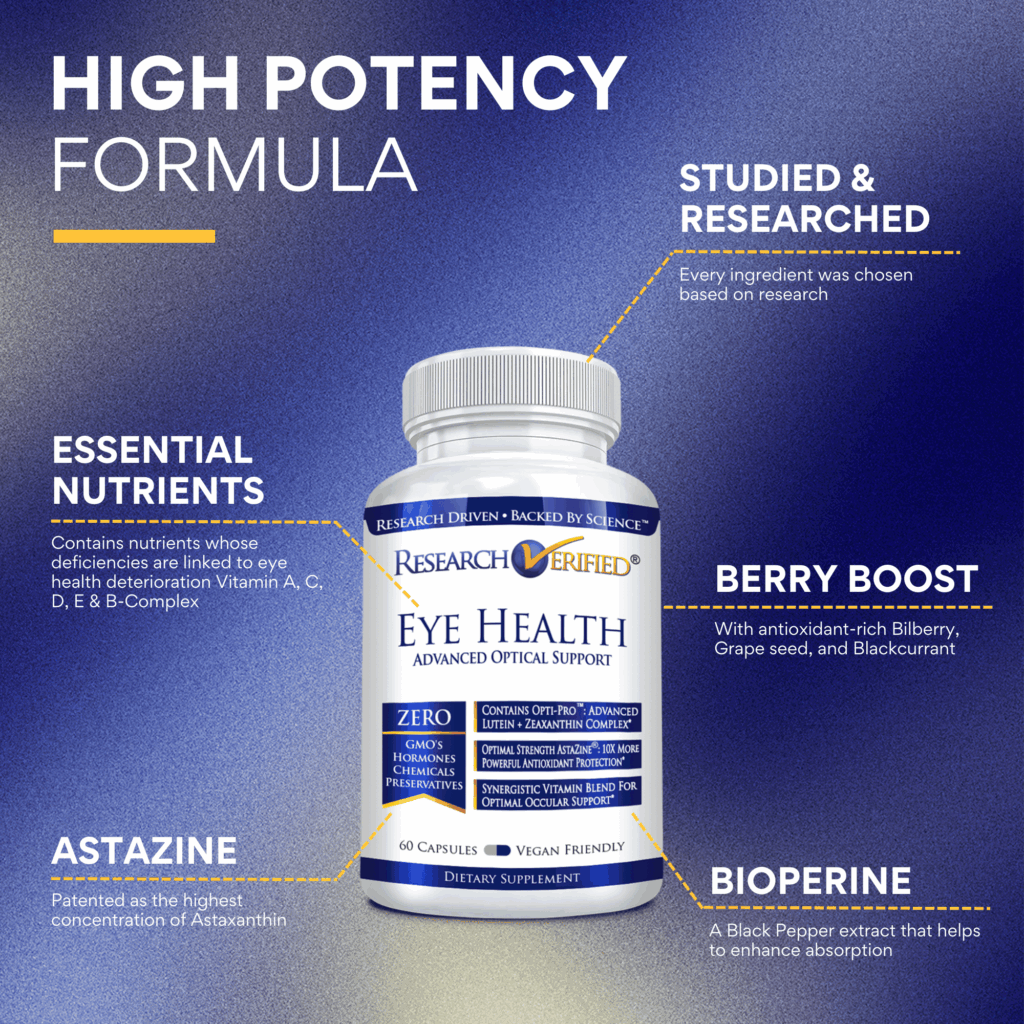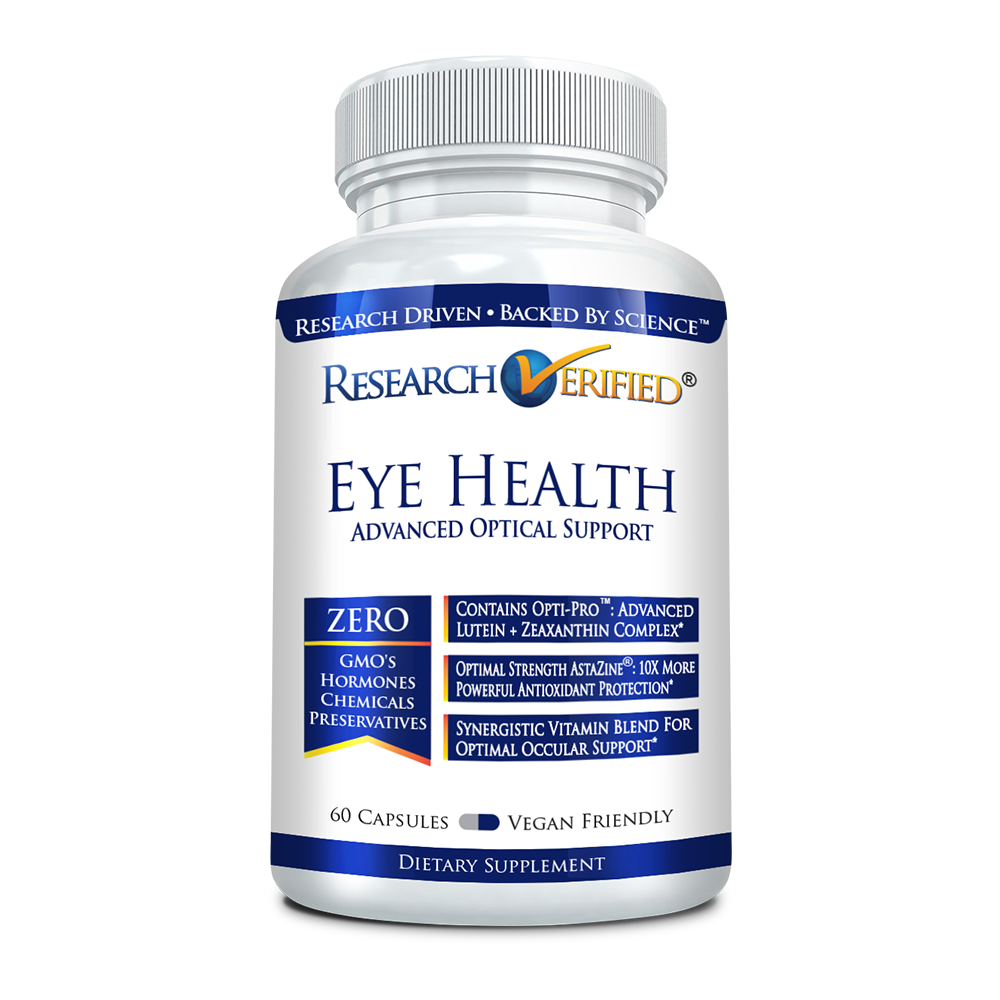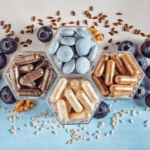Around your 40s and as you continue aging, small changes may start to creep into your vision. You may start to experience blurriness, difficulty with seeing things that are close, or increased sensitivity to glare. While vision does change with aging, it’s possible that these shifts aren’t just nuisances; they can signal the beginning of more serious eye issues such as macular degeneration, cataracts, or glaucoma (1). In addition to regular eye exams and healthy habits, nutrition also plays a big role in eye health. And as you age, getting enough of the right nutrients from food alone becomes more of a challenge (1). That’s where a well-formulated supplement can help enhance your efforts.
The Impact of Aging on Your Eyes
By midlife, your eyes begin to lose some of their flexibility and resilience. The lens becomes stiffer, making it harder to read up close (a condition known as presbyopia). The retina becomes more vulnerable to oxidative damage and light exposure. And, circulation to the eyes may slow causing your risk of age-related eye conditions increases. (1,2)
Key Nutrients for Vision Support
Research has shown that certain vitamins and plant compounds can help defend against age-related vision decline:
- Lutein & Zeaxanthin: Found in the macula, retina, and lens, these carotenoids help filter blue light, fight oxidants, and support visual sharpness (1).
- Vitamin A (Beta-Carotene): Essential for adjusting to low light and night vision (1).
- Vitamins C & E: Antioxidants that help shield eye tissues from free radicals (1).
- Zinc & Selenium: Support enzyme activity, maintain retinal health, and help prevent eye diseases (1,3).
- Astaxanthin: A powerful antioxidant that may benefit the retina and reduce inflammation (4,5).
A targeted supplement can deliver these nutrients in effective doses that are often hard to obtain through diet alone.
Top Foods For Eye Health
The right foods can help nourish and protect your eyes:
- Leafy greens (like spinach and kale) provide Lutein and Zeaxanthin for retinal protection.
- Carrots and sweet potatoes supply beta-carotene, a precursor to Vitamin A for night vision.
- Fatty fish offers DHA, an omega-3 essential for the retina and tear production.
- Eggs deliver easily absorbed Lutein, Zeaxanthin, and Zinc.
- Citrus fruits and berries are rich in Vitamin C, which helps protect eye tissues.
- Nuts and seeds offer Vitamin E and healthy fats to support cell health.
- Legumes provide Zinc and plant-based nutrients that support eye function.
A supplement can help fill nutritional gaps, but these foods form the foundation of long-term eye health.
Want a smarter approach to eye support? Learn more about Research Verified™ Eye Health
Who Should Take An Eye Health Supplement?
Eye health supplements can be a valuable part of your long-term vision care plan, but they’re not one-size-fits-all. The strongest research, especially from the AREDS and AREDS2 clinical trials, shows benefits for people at risk of advanced age-related macular degeneration (AMD) or those already diagnosed with intermediate AMD. In these cases, targeted nutrients like Lutein, Zeaxanthin, Vitamins C and E, and Zinc can help slow the disease’s progression.
If you don’t have AMD or other diagnosed eye conditions, supplementation may still offer protective benefits, particularly if your diet is lacking in key nutrients or if you’re experiencing early signs of age-related vision changes. However, supplements should never replace regular eye exams or a balanced diet. They’re most effective when used as part of a comprehensive strategy that includes medical guidance, proper nutrition, and routine care.
Always consult an eye care professional before starting a supplement, especially if you have existing conditions or are taking medication. A tailored approach offers the greatest potential for protecting your vision.
What Sets Research Verified™ Eye Health Apart
Research Verified Eye Health is designed for people who want more than just the basics. Its formula supports the eye from multiple angles—antioxidant defense, blood flow, retinal nourishment, and more.

Spotlight ingredients include:
- Astaxanthin from AstaZine®, which is considered the world’s purist natural astaxanthin. It is highly studied and has claims approved by the FDA, such as “Supports macular health as you age”, “proven to support healthy eye function”, and “supports healthy retinal cells” (6).
- Lutein (20 mg) & Zeaxanthin (2 mg), supported by research for maintaining macular health (1).
- Chromium Picolinate is believed to play a role in maintaining healthy intraocular pressure and ciliary muscle and to reduce diabetes-associated damage to the retina (7,8).
- Selenium, an antioxidant that may prevent the development or progress of age-related macular degeneration and cataracts (9,10).
- Plant-based ingredients like Bilberry, Grape Seed Extract, Black Currant, and Ginkgo Biloba for circulation and eye comfort (11).
- Quercetin, which may help protect the cornea and the retinas’ external barriers (12,13)
- B Vitamins (B1, B6, B12, Folic Acid), crucial for optic nerve function, preventing deficiencies linked to AMD, and vascular health (14,15,16,17).
- Bioperine®, added to increase nutrient absorption and product effectiveness (18,19).
Because my sister had some difficulties with the cataract surgery, I became open to other possibilities. Researching supplements I found this product. Digging deeper, I found that this product has more total vitamins and more of each in most cases when compared to other brands. -Verified Amazon Review

Final Thoughts
Vision changes with age, but there’s a lot you can do to support your eyes before issues arise. A high-quality supplement like Research Verified Eye Health provides the building blocks your eyes need to stay sharp and resilient.




Comments are closed.